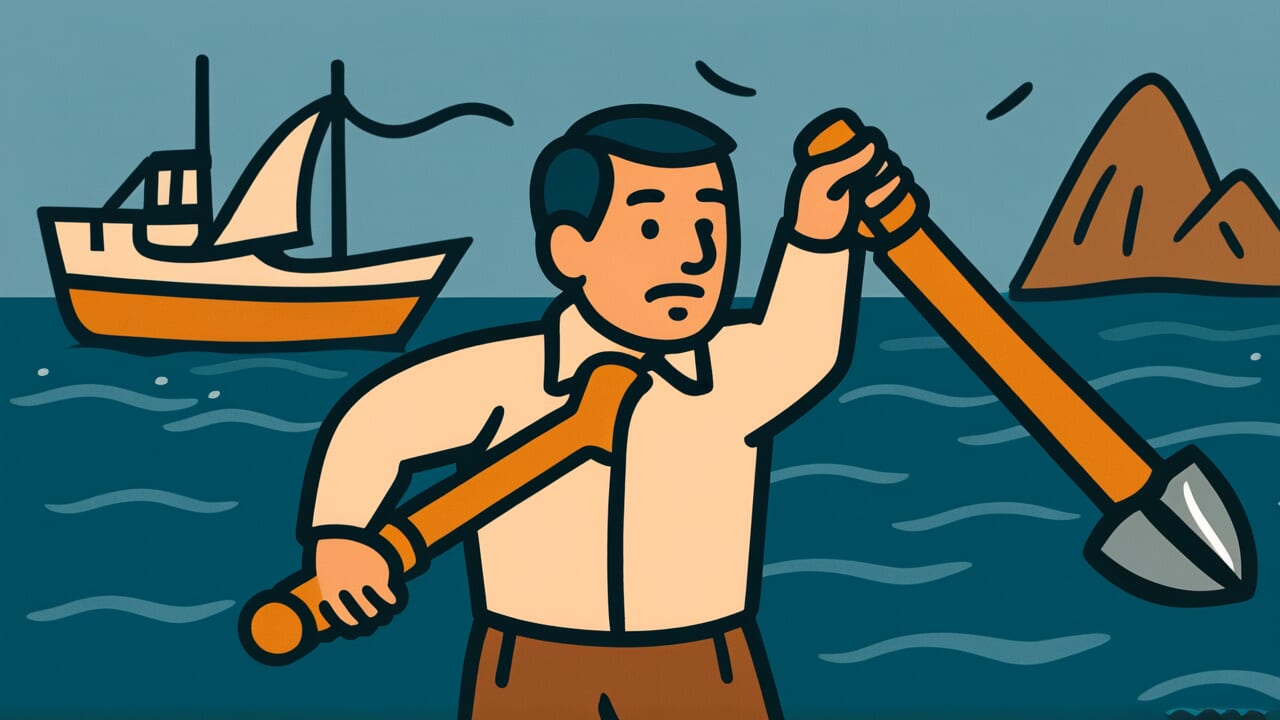How to Read “November take flail, let ships no more sail”
November take flail, let ships no more sail
[no-VEM-ber tayk flayl, let ships no mor sayl]
“Flail” rhymes with “sail” and “mail”
Meaning of “November take flail, let ships no more sail”
Simply put, this proverb means November weather becomes too dangerous for ships to sail safely.
The saying uses “flail” to describe how November winds whip and beat everything around. A flail was a farming tool used to thresh grain by beating it. When November “takes flail,” it means the month brings harsh, beating weather. The second part warns that ships should stop sailing because conditions become too risky.
Today we use this wisdom to talk about knowing when to stop risky activities. It applies when weather turns bad for outdoor work or travel. People might say it when storm season arrives and it’s time to secure boats. The idea works for any situation where conditions change from safe to dangerous.
What’s interesting about this wisdom is how it connects farming and sailing. Both activities depended completely on weather and seasons. The proverb shows how people learned to read nature’s signals. It reminds us that even experienced sailors knew when to respect the power of storms.
Origin and Etymology
The exact origin of this proverb is unknown, though it reflects centuries of maritime wisdom. Sayings like this developed in coastal communities where both farming and sailing were essential for survival. People needed reliable ways to remember when seasonal dangers began.
During medieval times and beyond, November marked a crucial transition for seafaring communities. Harvest season ended and winter storms began arriving with deadly force. Ships of earlier eras had limited weather forecasting and basic navigation tools. Sailors relied heavily on seasonal patterns and traditional knowledge passed down through generations.
The proverb likely spread through port towns and fishing villages along coastlines. Maritime wisdom traveled with sailors and merchants who shared knowledge about safe sailing seasons. Over time, such sayings became part of the common knowledge that helped communities survive harsh winters and dangerous seas.
Interesting Facts
The word “flail” comes from Latin “flagellum” meaning whip or scourge, which perfectly captures how November winds lash everything in their path. This proverb uses the farming tool as a metaphor because most people understood how violently a flail moved when threshing grain. The rhythm of the saying, with its rhyming pattern, made it easy to remember during an era when most knowledge was passed down orally rather than through written records.
Usage Examples
- Farmer to neighbor: “Better harvest these last fields before the storms hit – November take flail, let ships no more sail.”
- Harbor master to dock worker: “Tell the captain he should postpone until spring – November take flail, let ships no more sail.”
Universal Wisdom
This proverb reveals a fundamental truth about human survival: we must learn to recognize when conditions shift from manageable to deadly. Our ancestors discovered that nature operates in predictable cycles, and ignoring these patterns could mean the difference between life and death. The wisdom goes beyond weather forecasting to touch something deeper about human judgment and timing.
The saying captures our eternal struggle between ambition and caution. Throughout history, people have faced the temptation to push their luck when conditions deteriorate. Sailors might want one more profitable voyage before winter. Farmers might delay securing their crops. Travelers might ignore gathering storm clouds. This proverb emerged from countless experiences where such gambles ended in disaster.
What makes this wisdom universal is how it addresses our tendency to underestimate changing risks. Humans are remarkably good at adapting to gradual changes, but we often miss the moment when those changes become dangerous. The proverb teaches us to respect natural boundaries and seasonal limits. It reminds us that even skilled, experienced people must sometimes accept that conditions have moved beyond their ability to control or overcome them safely.
When AI Hears This
Humans have a strange mental trick when good times are ending. We become amazing at counting today’s profits but terrible at seeing tomorrow’s dangers. Our brains treat each successful trip as proof we can handle one more. The same confidence that made us rich starts making us reckless.
This happens because we think in straight lines, not curves. When sailing goes well for months, we expect it to stay predictable. But risk doesn’t climb slowly like a hill. It jumps suddenly like a cliff edge. Our minds can’t feel this invisible switch from safe to deadly.
What fascinates me is how this flaw might actually help humans survive. The sailors who push boundaries discover new trade routes and opportunities. Yes, some crash and lose everything trying for one last voyage. But others find treasure that careful people never reach. Your beautiful mistake is also your greatest strength.
Lessons for Today
Living with this wisdom means developing sensitivity to changing conditions in all areas of life. The key insight is learning to distinguish between temporary rough patches and fundamental shifts toward danger. This requires honest assessment of our situation rather than wishful thinking about what we can handle.
In relationships and work, this wisdom helps us recognize when to pause risky endeavors. Sometimes we push forward with projects or conversations when conditions have turned hostile. The proverb suggests there are seasons for bold action and seasons for protective waiting. Recognizing these transitions takes practice and often goes against our desire to maintain momentum.
The challenge lies in accepting that retreat or delay doesn’t mean permanent defeat. November storms eventually pass, and sailing season returns. The wisdom teaches patience with natural cycles rather than fighting against them. Communities that honored such seasonal boundaries survived and thrived, while those that ignored them often paid heavy prices. This ancient knowledge about timing and limits remains as valuable today as it was for sailors watching November skies darken over dangerous seas.



Comments